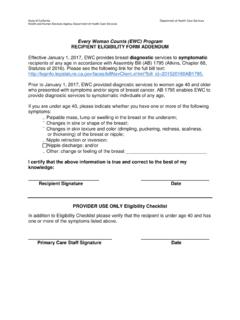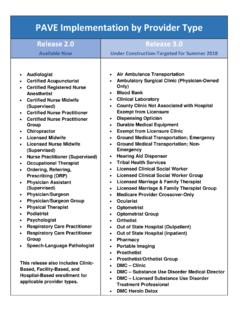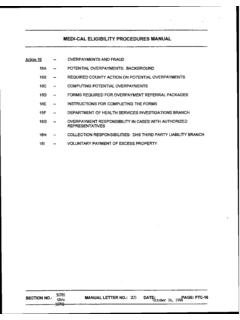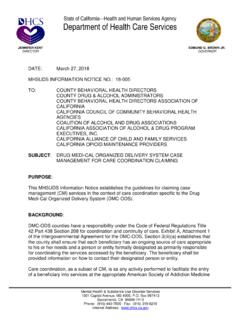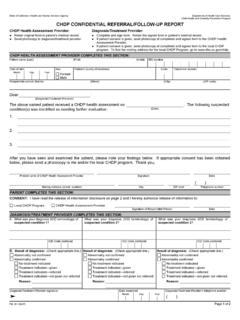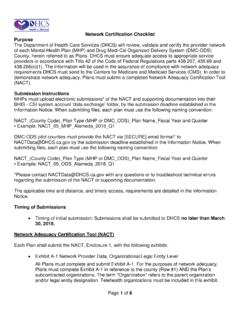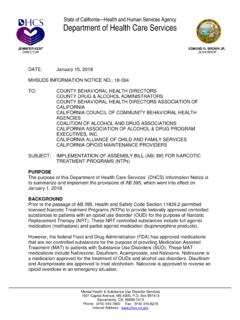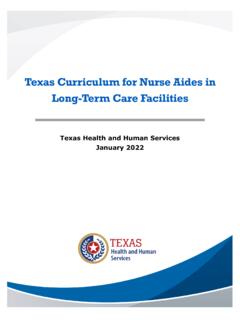Transcription of Rights For Individuals In Mental Health Facilities - California
1 handbook Rights for IndividualsIn Mental Health FacilitiesAdmitted Under the Lanterman-Petris-Short ActCalifornia Department of Health Care ServicesYour Rights as a Patient If you have any questions or would like to make a complaint about a possible violation of your Rights , please call the advocacy office listed on theback cover of this Rights law is composed of a complex and evolving system of statutes, regulations, and court decisions. This handbook should be considered a guide, but it may not accurately reflect all the Rights available to persons at all times. The person in charge of the facility in which you are receiving treatment is responsible for ensuring that all your Rights in this handbook are protected.
2 You should be informed of your Rights in a language and a manner that you can understand: On admission to a facility When there is a change in your legal status When you are transferred to another unit or facility At least once a year Please contact your patients Rights advocate if you believe that your Rights may have been denied or violated, or if you have questions that may not be specifically addressed in this handbook . 2 Table of Contents Page Your Rights as a 2 Introduction .. 5 Access to the Patients Rights Advocate .. 6 What to Do If You Have a Complaint .. 7 Rights While You Are Involuntarily Detained.
3 8 Confidentiality .. 14 Medical Treatment .. 14 Right to Refuse Treatment .. 15 Medications and the Informed Consent 17 Capacity Hearing for Medications .. 19 Rights That Cannot be Denied .. 20 The Right to Humane Care .. 20 The Right to be Free from Abuse or Neglect .. 21 The Right to Social Activities and Recreation .. 21 The Right to Education .. 22 The Right to Religious Freedom and Practice .. 22 The Right to be Free from Discrimination .. 23 Rights That May be Denied with Good Cause .. 24 Clothing .. 24 Money .. 24 Visitors .. 24 Storage Space .. 253 Page Personal Possessions.
4 26 Writing 26 Good Cause .. 27 Definitions .. 284 Introduction If you are receiving voluntary or involuntary Mental Health services in one of the Facilities listed below, you have the Rights outlined in this handbook . Your Rights may vary depending on your legal status or the type of facility you reside in. Your Rights may not be waived by your parent, guardian, or conservator. State Hospital Acute Psychiatric Hospital Psychiatric Unit of a General Acute Care Hospital Skilled Nursing Facility Special Treatment Program Licensed Group Home Adult Residential Facility Social Rehabilitation Facility Licensed Family Home Adult Day Care Facility Psychiatric Health Facility Mental Health Rehabilitation Center Community Treatment Facility 23-Hour Treatment Facility You cannot be threatened or asked to give up any of your Rights as a condition for admission or receiving treatment; however, you may choose not to exercise a specific right.
5 5 Access to the Patients Rights AdvocateYou have the right to see a patient s Rights advocate who has no clinical or administrative responsibility for your Mental Health treatment and to receive his or her services. Your advocate s name and telephone number are located on the back cover of this handbook . You have the right to contact the patients Rights advocate at any time. The facility where you are staying will provide you with assistance to ensure that you can exercise this right. You have the right to communicate with and to receive visits privately from your patients Rights advocate or attorney.
6 6 What to Do If You Have a Complaint You have the right to complain about your living conditions, any physical or verbal abuse, any threats or acts of cruelty, or your treatment in the facility without being punished for voicing such complaints. The patients Rights advocate is responsible for investigating and trying to resolve complaints concerning your Rights . If the advocate is unable to help you with your concern, your complaint may be referred, with your permission, to another agency that can assist you. If you are dissatisfied with the advocate s response to your complaint, you can request that the complaint be referred to the facility director or to the local Mental Health director.
7 7 Rights While You AreInvoluntarily DetainedThe following information pertains to Individuals who are involuntarily detained. 72-Hour Hold or 5150 When a person, as a result of a Mental Health disorder, is a danger to others, or to himself/herself, or gravely disabled, they may be taken into custody against their will for up to 72 hours for assessment and evaluation. When there is probable cause for involuntary detention, those who are authorized to take an individual into custody are: A peace officer A professional person in charge of a facilitydesignated by the county for evaluation and treatment, or a member of the attending staff Designated members of a mobile crisis team A professional person designated by the county While being detained, crisis intervention or placement for evaluation and treatment may be initiated.
8 8 The facility where you are being detained requires a written application stating why there is probable cause to believe that you, as a result of a Mental disorder, are a danger to yourself or others, or are gravely disabled. If the probable cause is based on the statement of a person other than a police officer, a member of the attending staff, or a professional person, this person is liable for his/her statement in a civil action. If you were brought into a Mental Health facility against your will due to the circumstances described above, you may be held for up to 72 hours for treatment and evaluation unless the person in charge can establish that you need an additional 14 days of Mental Health treatment (Welfare and Institutions Code Sections 5150 and 5250).
9 914-Day Certification for Intensive Treatment or 5250 If a person is detained for 72 hours under the provisions of Section 5150 of the Welfare and Institutions Code (described on pages 8-9 in this booklet) and has received an evaluation, he or she may be certified for no more than 14 days of intensive treatment related to a Mental disorder or an impairment by chronic alcoholism under the following conditions: The professional staff of the facility that provides evaluation services has analyzed the person s condition and found that the person is a danger to himself/herself or others or is gravely disabled.
10 The person has been advised of the need for treatment on a voluntary basis, but is not willing or able to accept treatment. If you are held beyond 72 hours, you have the right to remain in the hospital for voluntary treatment. If you do not want to stay voluntarily, the facility where you are staying will conduct a certification review hearing within four days of the end of your 72-hour hold. You 10may be represented at this hearing by a patients Rights advocate or another person of your choice. You can also request to have family members present to help explain your circumstances (Welfare and Institutions Code Section 5250).

